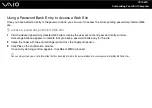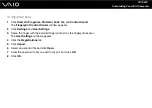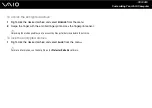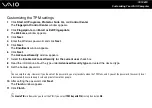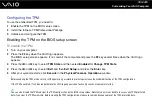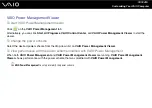
139
Customizing Your VAIO Computer
Using Trusted Platform Module (TPM)
Trusted Platform Module (TPM) is embedded in selected models and provides your computer with basic security functions.
In combination with the TPM, you can encrypt and decrypt your data to strengthen computer security against inappropriate
access.
TPMs are defined by Trusted Computing Group (TCG) and also called security chips.
See the online Specifications to find whether the TPM is available on your model.
Precautions on Using the TPM
❑
Although your computer is provided with the latest TPM security functions, these functions do not assure complete
protection of your data and hardware. Sony assumes no liabilities for any problems and damages arising out of your use
of the functions.
❑
After you have installed the Infineon TPM Professional Package, you need to set a few TPM passwords on your computer.
Without these passwords, you will not be able to restore any TPM-protected data. Make sure to write down the passwords
and keep them safe and private from other people.
❑
Make sure to make backup copies of the latest emergency recovery archive file, emergency recovery token file, password
reset token file, and personal secret file and keep them safe and private from other people before sending your computer
for repair. The data stored in the TPM that is embedded on the motherboard may be lost or corrupted during the course
of repair.
❑
During the course of repair, the TPM may be replaced even if there are no problems with the modules. In such a case,
use the backup copies of the emergency recovery archive file, emergency recovery token file, password reset token file,
and personal secret file to restore the TPM configuration.
❑
Make sure to make a backup copy of the data stored on the hard disk before sending your computer for repair. The hard
disk may be initialized and returned after the repair work and, in such a case, you will not be able to restore the data on
the hard disk using the backup copies of the emergency recovery archive file, emergency recovery token file, password
reset token file, and personal secret file.


